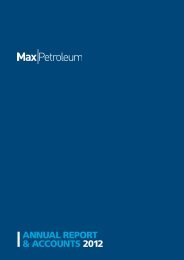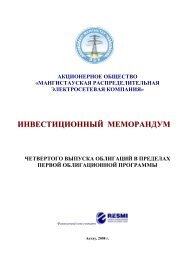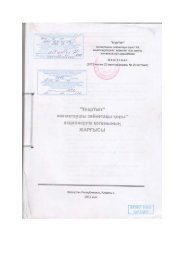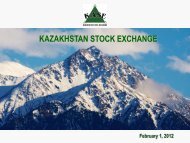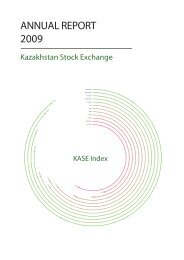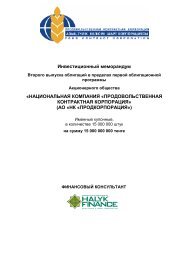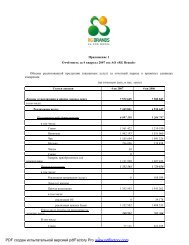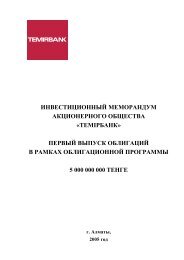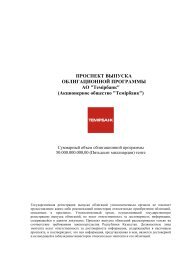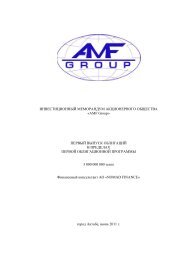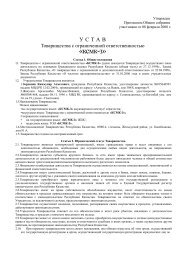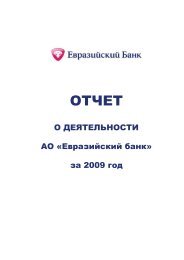JPMorgan - KASE
JPMorgan - KASE
JPMorgan - KASE
You also want an ePaper? Increase the reach of your titles
YUMPU automatically turns print PDFs into web optimized ePapers that Google loves.
(11,642 tonnes per day) in September, an improvement of 22% over the average for the second<br />
quarter. This growth in shipments through Tekesu continued into early October with shipments<br />
of approximately 96,825 BOPD (12,500 tonnes per day). Recently, loading at Tekesu has<br />
repeatedly reached levels of 139,430 BOPD (18,000 tonnes per day).<br />
The improvement in crude export shipments has been as a result of an increase in the number of<br />
leased rail cars under our control, together with greater access to the Atyrau-Samara pipeline.<br />
The number of leased rail cars in our control continues to grow and currently stands at<br />
approximately 800 crude cars and is expected to exceed 3,000 in 2003. Access to Atyrau-Samara<br />
has improved over the last few months and in September, this route accounted for 40% of the<br />
crude oil shipped for export by HKM. More recently, the Ministry of Energy in Kazakhstan<br />
assured us of equitable and independent access to Atyrau-Samara and the port of Aktau. The<br />
potential for greater access to these export routes in future months exists and there is capacity to<br />
handle future planned production increases.<br />
The increase in crude exports has helped reduce the crude oil inventories held at Kumkol and<br />
Tekesu, although this has been partially offset by increases in the volume of oil in transit and<br />
awaiting loading at ports under non-FCA contracts.<br />
Crude prices remained robust on the back of the potential crisis surrounding Iraq and lower than<br />
anticipated U.S. crude stocks. The average of the day’s dated Brent price started the third quarter<br />
at $25.71 per barrel and finished the quarter at $28.875 per barrel. Volatility remained high with<br />
a dated Brent swing of $4.46 per barrel during the quarter and dated prices ranging from a low<br />
of $25.08 and a high of $29.54 during the quarter. Sweet crude differentials improved against<br />
last quarter with Tengiz CIF Mediterranean quotes recovering to a 10 cent premium to Brent in<br />
August although slipping during September to a 20 cent discount. Nevertheless, this was still an<br />
improvement to the deep discounts seen in the second quarter. Kumkol CIF Mediterranean<br />
meanwhile is currently trading 30 to 40 cents per barrel better than Tengiz CIF Mediterranean.<br />
Refinery operations and capacity. Feedstock is refined into a number of products, which<br />
generally are sold domestically. The refinery also refines crude oil on behalf of third parties for a<br />
processing fee. The refinery at Shymkent has a total design operating capacity of 6.6 million<br />
tonnes per year or the equivalent of approximately 12.8 MMbbls per quarter and approximately<br />
51.1 MMbbls per year. The crude oil feedstock for our refinery is primarily acquired from our<br />
Upstream operations, but purchases are also made from third parties.<br />
During the third quarter of 2002, the Shymkent refinery processed 7.1 million barrels or 77,172<br />
BOPD, of which 4,347 BOPD was refined for third parties. The number of barrels processed in the<br />
third quarter of 2002 represented a 33% increase over the 5.3 million barrels or 58,392 BOPD<br />
processed in the second quarter of 2002. This was consistent with the 7.2 million barrels or 78,695<br />
BOPD that was processed in the third quarter of 2001. None of the barrels processed in the<br />
second quarter of 2002 was refined for third parties. The variation between processing levels in<br />
the second and third quarters of 2002 was primarily due to the maintenance shutdown in the<br />
second quarter.<br />
We have been focusing on improving the refinery’s yields, thereby improving our margins. For<br />
example, we have reduced the production of mazut (heavy fuel oil), which is a lower-end product<br />
and is in over-supply in the market. Mazut yield was reduced to 31% for the third quarter of<br />
2002 with a consequential increase in the yield of higher value products. A project is underway at<br />
the refinery to produce Vacuum Gasoil which will further reduce mazut yield and thereby<br />
improve refining economics.<br />
Refined product sales increased in the third quarter of 2002 over the second quarter primarily as<br />
a consequence of the maintenance shutdown in the second quarter, which reduced the<br />
production and sales volumes. Refined product prices continued the recovery started in the<br />
33



